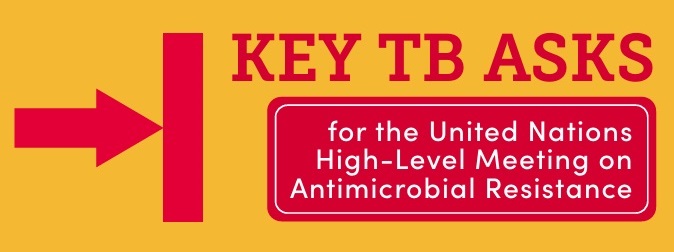The Stop TB Partnership is pleased to announce that His Excellency Dennis Francis, President of the UN General Assembly, has shared a final draft of the Political Declaration on Antimicrobial Resistance (AMR) that is expected to be agreed by member states on 26th September 2024 during the UN High-Level Meeting on AMR in New York.
The draft Declaration outlines urgent measures and actions to combat the rise of AMR, recognizing its direct impact on sustainable development, public health, food security, and global economic stability, with TB highlighted as one of the key issues in the Declaration.
Key commitments in the declaration include targets to reduce the global deaths associated with AMR by 10% by 2030, a commitment to strengthen surveillance and diagnostic capacities to detect and respond to drug-resistant infections early and accelerate the development of new antibiotics and treatments, a funding target of USD 100 million to catalyse the achievement of at least 60 per cent of countries having funded AMR plans by 2025, and agreement to establish an independent panel for evidence for action against antimicrobial resistance in 2025.

Stop TB Partnership, along with our partners, developed a set of Key Asks for the AMR Political Declaration in May 2024 and through strong advocacy efforts, the TB community has ensured that TB is a top priority in the AMR Political Declaration with seven TB references in the Declaration.
The key highlight is a dedicated TB paragraph (para 59) that recognizes drug-resistant TB as one of the key components of the global challenge of AMR, and expresses grave concern that drug-resistant TB places an additional burden on health and community systems, especially in low- and middle-income countries, and thereby poses a critical challenge that could reverse the progress made against the disease, against antimicrobial resistance and towards the Sustainable Development Goals.
The Declaration (para 37) also recognizes the Stop TB Partnership’s Global Drug Facility as a key procurement and market-shaping instrument, recognizing its key role in supplying TB and AMR medicines to countries.
Another key paragraph proposed by the TB community recognizes the need to support vulnerable groups (para 15). It recognizes the profound socioeconomic challenges and financial hardships faced by people affected by antimicrobial resistance and affirms that people require integrated, people-centred prevention, diagnosis, treatment, management of side effects, and care, as well as psychosocial, nutritional and socioeconomic support, including to reduce stigma and discrimination.
The Stop TB Partnership would like to convey its congratulations to the High-Level Meeting co-facilitators, H.E. Mr. François Jackman, Permanent Representative of Barbados to the United Nations, and H.E. Vanessa Frazier, Permanent Representative of the Republic of Malta, as well as the many member states that championed the inclusion of TB in the Declaration, and recognize their leadership and commitment towards this important milestone.
